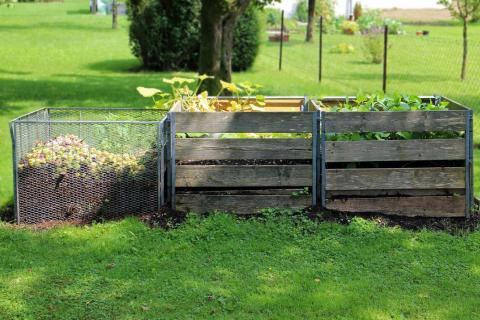As I clean up my garden this fall, is it okay to put everything on the compost pile?

Many gardeners like to perform a garden clean-up at the end of the season before the onset of winter. Usually this means cutting back perennials, pulling up spent vegetables and annuals, and raking up leaves as they drop from the trees and shrubs. Tidying up the yard and garden in the fall saves a lot of effort in the spring and helps gardeners limit some issues with overwintering pests and diseases.
Cleaning up the garden usually produces a large amount of organic waste material that must either be composted on site or hauled away to a transfer station. Those who have opted to maintain their own backyard compost pile must pay close attention to which materials are placed on the pile and which are discarded. Which materials you can safely compost has everything to do with the composting method you use.
Composting is often broken down into two separate categories, cold and hot. The easiest method, cold composting, requires little maintenance and simply involves piling materials on the ground or in a bin and letting them sit until they break down. This method can take as long as a year or more for the compost to be finished, which is fine for many gardeners. The piles do not usually get hot enough to kill plant pathogens, so diseased plant material should be kept out.
Hot composting is fairly labor intensive, but it yields finished compost in a relatively short period of time. It requires a large amount of organic material for piles to reach a height and width of least 4-5 feet, and the piles must be kept moist and well aerated with frequent turnings. Well executed hot compost piles can reach over 140℉, which is hot enough to kill most weed seeds and plant diseases. Gardeners that maintain hot compost piles can put all yard waste onto the pile without worrying about whether pathogens will be killed. However, most backyard compost piles do not fall into this category because they do not get nearly hot enough. Most home gardeners do not have enough yard trimmings to create a large enough pile for high temperatures to be reached and sustained.
If you don’t know whether your compost pile gets hot enough to kill plant diseases, err on the side of caution. Send all diseased plant material to the transfer station, not the compost pile, to reduce infections next season.
Got questions? The Ask UNH Extension Infoline offers practical help finding answers for your home, yard, and garden questions. Call toll free at 1-877-398-4769, Monday to Friday, 9 a.m. to 2 p.m., or e-mail us at answers@unh.edu.
Related Resource(s)
Do you love learning about stuff like this?
SUBSCRIBE TO Granite State Gardening newsletter
Got questions? The UNH Extension Yard and Garden Infoline offers practical help finding answers for your yard and garden questions.
Call toll free at 1-877-398-4769, Monday to Friday, 9 a.m. to 2 p.m., or fill out webform.
